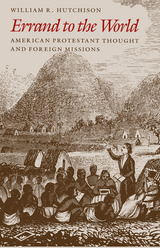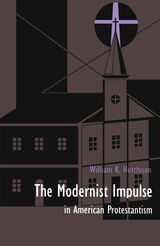


One of the nation's foremost authorities on American religion here traces the immensely important strand of liberal thought in American Protestantism during the last century. From a refreshingly candid viewpoint that religious ideas operate with some autonomy and religious thought is only partially reducible to social experience--or explained by it, William R. Hutchison has produced an original, lasting work that will appeal to readers interested in the formation of American culture and in the shaping role played by religion.
Modernism, the author demonstrates, was a carefully wrought theological affirmation of those "generous hopes for the world's destiny" (Hawthorne's phrase) that energized nineteenth- and early twentieth-century reform. Although the modern religious impulse has been widely and correctly remembered as having called for the adjustment of religious ideas and practices to the demands of science and contemporary thought, more profound ideas gave the trend its force and integrity. Particularly, modernism formulated positive theological convictions about the presence and action of God in cultural development.
Combining judiciousness with a finely wrought style, Hutchison depicts the uncertain development of liberalism before 1875 in Unitarianism, in Congregationalism, in the concepts of individual regeneration preached by Horace Bushnell, and in the New School Presbyterianism of Chicago. The liberals' determination to preserve the special claims of Christianity in the face of doubts raised by Darwinism and the Higher Criticism is fully discussed, as is the evolution of forms of theism that found God revealed in many places besides Holy Writ. The social crises of the early twentieth century, together with developing doubts about human nature and progress, form the backdrop for an evaluation of external and internal criticisms of liberal thought. The Social Gospel and associated movements are skillfully explored. Hutchison also weighs the attacks upon liberal and modernist thought that followed World War I, when fundamentalism and then humanism and Reinhold Niebuhr's neo-orthodoxy protested with increasing stridency against the liberal world view.
The author views modernism as a faith arising from an extraordinary confidence, now largely dissipated, in the coming of an earthly kingdom. But he also believes that the modernist form of thought continues to have powerful effects, particularly in modifying the sense of alienation between religion and culture that historically has been a trait of Western society.
This volume, imbued with the deeply felt vision of a remarkable author, is a model of clarity and a work of great historical importance.
READERS
Browse our collection.
PUBLISHERS
See BiblioVault's publisher services.
STUDENT SERVICES
Files for college accessibility offices.
UChicago Accessibility Resources
home | accessibility | search | about | contact us
BiblioVault ® 2001 - 2024
The University of Chicago Press









